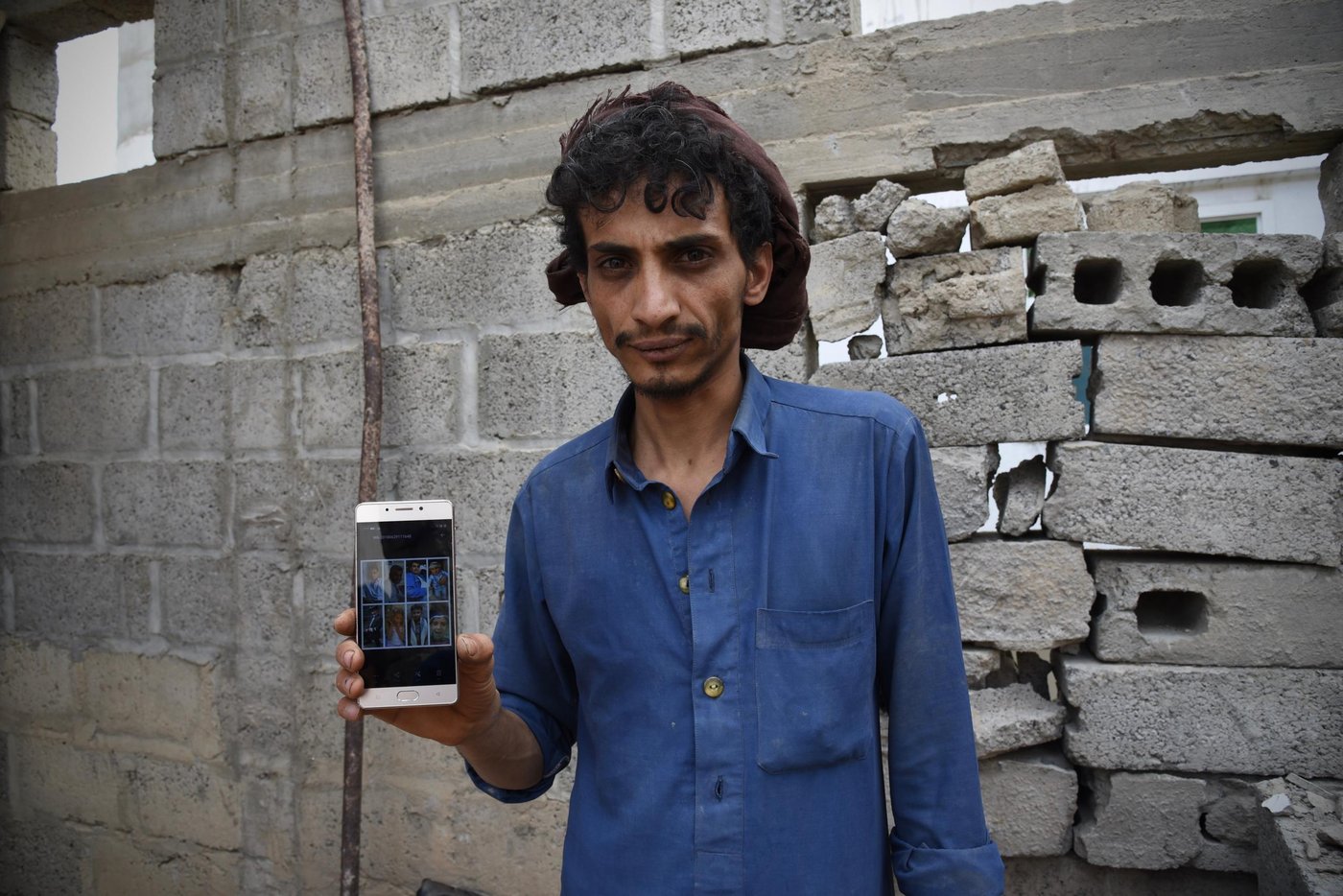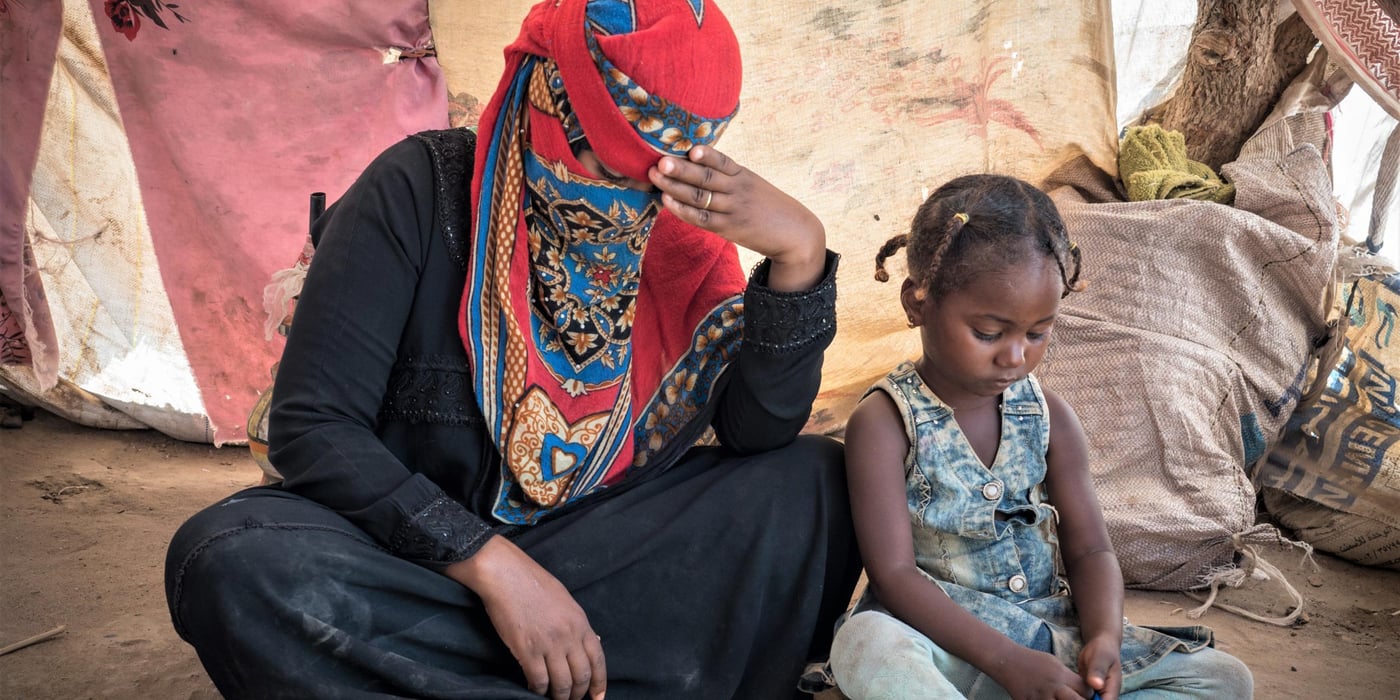
Förstörelse överallt
Hon har precis tillbringat två veckor i Jemen - ett land som för närvarande genomgår en av världens värsta humanitära kriser. Under vistelsen blev hon ständigt påmind om att hon befann sig i en krigszon.
- Bombflyg svävade ofta över staden och våra huvuden, och ibland smällde det kraftigt. Vi försökte lokalisera ljudet för att ta reda på var det slog ned. De cirklade ständigt över oss och påminde oss om att något kunde hända när som helst, säger hon.
- I Jemen ser man ödeläggelsen överallt - hus i ruiner som har varit människors hem, stora hål i marken där bomberna har slagit ner och sönderbrända bilar på gatorna.

Förlorade åtta familjemedlemmar
Antalet dödade civila är extremt högt i Jemen. Sedan 2015 har 60 000 människor dödats eller skadats i konflikten.
– Jag mötte en familj som hade förlorat åtta familjemedlemmar i en attack, berättar Becky. Deras hus träffades av en bomb i somras, och det är stora hål i taket. De som är kvar är fullständigt traumatiserade. Jag pratade med far i huset och hans två söner i min ålder, strax under 30 år. Det var smärtsamt att se lidandet och hopplösheten i deras ögon. "Vi har ingen framtid längre. Nu måste vi bara hitta mat till barnen, så att de överlever”, sa de.
”De siktar mer på civila än på varandra. Det här kriget mot oskyldiga måste få ett slut.”Yusuf, 28 år, förlorade åtta familjemedlemmar när deras hus träffades av en bomb.
Fattigdom och ekonomisk kollaps
Förutom spåren av kriget, var fattigdomen synlig på Sanas gator.
– Folk som tidigare har haft tillräckligt för att klara sig, måste nu tigga på gatorna för att överleva. Detta är verkligheten för jemeniterna idag och så har det varit i över tre år.
Jemen var redan ett av de fattigaste länderna i regionen före kriget, och nu har en ekonomisk kollaps lett landet till en humanitär kris. Enligt Becky märker befolkningen det på tre sätt - priserna på vanliga matvaror som ris och bröd har stigit dramatiskt, många får inte längre lönen utbetald och valutan har fallit kraftigt i värde.
– Ekonomin i landet håller på att krascha helt. Allt fler går i desperation ut på gatorna för att försöka höja sin röst och demonstrera. Många har nått bristningsgränsen.
Sjukdomsutbrott
Förutom dagliga attacker och ekonomisk kris, så härjar kolera och andra sjukdomar. Många internt fördrivna bor i läger utan lämpliga hygieniska förhållanden, vilket går ut över deras hälsa.
– Deras liv reduceras till att försöka överleva varje dag. De människor jag träffade sa: "Vi trodde aldrig att vi skulle hamna i den här situationen, vi har förlorat vår värdighet".
Läs också: 9 saker du borde veta om krisen i Jemen
Skamligt
Becky träffade människor i sin egen ålder som berättade att de känner att hela världen är emot dem.
– Som jemenitiska medborgare känner de att de inte har några möjligheter, att de är fångade i det krigshärjade hemlandet utan något annat val än att försöka överleva.
Hon tycker att det är skamligt att världen låter kriget fortsätta.
– Det är ofattbart att alla parter, både de som är direkt involverade i kriget och västliga länder som Norge, som är indirekt involverade genom oljefondens investeringar, får lov att gå in i ett land och fullständigt ödelägga civilbefolkningens liv. Det är helt avgörande att USA, England, Iran och Frankrike nu pressar parterna i konflikten till en omedelbar vapenvila och en politisk lösning.
NRC är på plats
NRC är på plats i Jemen, men restriktioner från de båda stridande parterna gör det svårt att nå fram med hjälp till dem som behöver den.
Under 2017 gav NRC livräddande hjälp till mer än 760 000 människor i landet. Becky är oerhört imponerad av sina jemenitiska kollegors insatser, som har levt och arbetat där kriget pågår i mer än tre år.
– Många av våra kollegor har själva drivits på flykt och lever i konstant rädsla för egen del och sina familjer. Ändå kommer de till jobbet varje dag för att göra en insats för sina medborgare. De lever under en enorm press och gör ett beundransvärt jobb. Själv kunde jag sätta mig i ett FN-flygplan och resa hem till trygga Norge. De blir kvar där.
Läs mer om NRC:s arbete i Jemen.
Stöd vårt arbete:
Swisha din gåva på valfritt belopp till 90 05 810


![Yasin Ismail has been working for NRC for five years and believes NRC is one of the best organisation to work for. Yasin started working for NRC as an Education Assistant and is now an Education Coordinator at NRC's Aden area office.
Yasin believes education is a critical component of the work NRC does, because of its great impact on people’s lives. He recognises it as a basic human right, important to the development of children and youth to fulfill their potential, and critical to breaking the inter-generational cycle of poverty.
The impact of the conflict in Yemen has been catastrophic. Schools have been destroyed or occupied by armed groups or displaced populations, which have deprived children in some areas from accessing school for more than four years.
Children in Yemen are struggling to cope with the violence they have faced during the conflict, and continue to face imminent danger as conflict carries on and exposes them to UXOs, mines and crossfire.
Yasin believes the security situation, which results in restricted access and unpredictable funding for education, are two of the main challenges in his job. He said that affected communities need access to aid but will sometimes have challenges accessing this due to long delays at checkpoints or challenges reaching distribution sites.
Yasin wants to help and support those affected by war in Yemen and believes that we can change the world with education. “[We should] Always follow our dreams and believe in ourselves. For every ending - there is a new beginning, for every memory - there is a dream ahead.”
"I hope for peace and stability for our people and country. I hope for our children and youth to get quality education because that will help them to build their future. I believe the education is the only approach to protect future generations, because it gives people a chance for healthy development, restores a sense of normality, and provides important life skills. Further to that, an education intervention is an investment in the long-term future, and in the peace, stability and economic growth of Yemen”.
More information:
These kids, like many others, leave for school very early because it takes them an hour or as long as two hours for some to walk. Ensuring children have sufficient access to nutrition is very important for children expending huge amounts of energy on commuting, learning and playing, and ensures they are able to engage appropriately in class. Lialy was among the children without anything to eat before coming to school. NRC has started to provide high energy biscuits to children in Lialy's school, who expressed their happiness at receiving the biscuits. Several children mentioned feeling more energetic and active as a result, and said they could concentrate more in class.
Information about the school:
Al-Qadisia school is located in Al-Qubbiyta district in Lahj and was one of the first schools in which NRC has delivered programmes. NRC's team describe the AlQadisia as a normal school with an engaged community but experiencing problems including nearby landmines. As displaced families continue to move into the area, the number of students at the school continues to grow, creating overcrowding. NRC's programme is supporting rehabilitation of the school building, distribution of recreational, cleaning and scholastic materials, training of teachers and provision of high energy biscuits for students.
Education in Hard to Reach Areas:
One of NRC’s global priorities is to deliver aid and services to people in hard to reach areas. We worked with the Education Department to select this school and others identified as being among the most in need. In travelling to the school form NRC's office in Aden, staff encounter several checkpoints, threatened areas and landmines.
Our programming in Yemen's southern governorates reaches people in Lahj, Abyan and Al-Dalea, among other areas. Operating in these areas is complicated and challenging: our staff travel through checkpoints, some of which create traffic, preventing access to project sites. Several areas remain affected or threatened by conflict, explosions are often heard, landmines dot areas across Yemen and bureaucratic challenges delay or complicate processes.
Where mines explode, civilians can suffer on multiple levels as people cannot only sustain injuries, but lose mobility and access to fields and other sites used for cultivation.
Efforts should be made to call on the authorities and specialised organisations to strengthen demining operations and reduce the number of civilian casualties.
Photo: Ingrid Prestetun/NRC](/cdn-cgi/image/width=1400,format=auto,fit=crop,height=700/globalassets/sverige/yemen-31.jpg)

